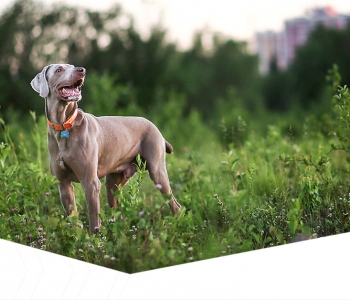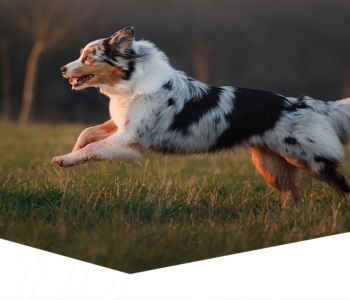
Feeding tips for growing puppies
Selecting a good puppy food that is specifically formulated for growing dogs and establishing proper feeding habits will help contribute to healthy development throughout a puppy’s life, and as a breeder you have the responsibility of educating new puppy owners with as much useful information as you can. After all it will only help them look after your little puppies even better.
Growth is a nutritionally demanding period of time because of the added energy and nutrients that are needed to support tissue accretion (growth) and development. The first 6 to 9 months of a dog’s life are particularly important because this is the period of the most rapid growth. Important nutritional considerations include:
Energy (Calories): The energy needs of a growing puppy are approximately twice the requirement of an adult dog of the same weight. Because puppies have high caloric needs but small stomachs, they require an energy and nutrient-dense food that can supply all of their needed calories and essential nutrients in a relatively small volume of food.
Dietary Protein: The protein requirement of growing puppies is higher than that of adult dogs because of the needs for growth and development of tissues. High-quality proteins provide all of the essential amino acids that a growing puppy needs and are also highly digestible. Studies have not shown that a perceived ‘high’ protein level (even above 31.6%) causes any type of growth abnormality.
Antioxidants: A puppy’s immune system starts to develop in the first few months of his life. In the first 24 hours after birth, a puppy gets protective antibodies from the colostrum, which will provide protection for the first four to eight weeks. After this period the immune system is still relatively underdeveloped and feeding high quality puppy nutrition containing antioxidants such as vitamin E and beta-carotene will help support the development of a young puppy’s natural defences during this time of vulnerability.
DHA for brain development: DHA (docosahexaenoic acid) is a critical nutrient necessary for the development, growth and maintenance of the puppy’s brain. It is one of the most abundant fatty acids in the brain, but young animals may be unable to synthesise enough of it. Therefore, puppies need an external dietary supply, gathered in 3 ways –
•Through the placenta when they are foetuses
•From mother’s milk when they are very young
•Via the diet as they grow.
Including DHA at a clinically proven level can help make a puppy smart and trainable.
Better trainability can mean better socialisation into a family environment, a quicker grasp of obedience training, less destructive behaviour and, ultimately, fewer dogs abandoned and relinquished due to “bad” behaviour.
Some puppy feeding guidelines to share with new puppy owners –
Feed your puppy to promote a controlled, but not a fast rate of growth, especially if he is a large or giant breed. Here are a few feeding guidelines for your puppy’s first year:
- Select a puppy food that is formulated specifically for your puppy’s adult size and lifestyle.
- Large breeds grow faster than other puppies, so it’s important to aim for a slower rate of growth with a specially formulated puppy diet such as Eukanuba Puppy for Large Breeds. Overfeeding a large breed puppy, or trying to push the growth rate too fast, can lead to serious bone and joint disorders.
- Never supplement a puppy’s diet with vitamins and minerals, especially large and giant breeds. Mineral ‘toxicity’ is highly likely with over supplementation of calcium causing skeletal developmental abnormalities.
- Transition to the new food gradually over a week to 10 days to prevent gastrointestinal upsets.
- Begin by mixing a small amount of the new food with your puppy’s old food and increase the proportion of the new food in the mixture every three days.
- Feed an amount that supports a lean and well-toned body condition throughout growth and avoid over-feeding.
- Instructions on the food’s label provide general guidelines for estimating an initial volume of food to offer. You can adjust this amount in response to your puppy’s weight and body condition.
- Monitor your puppy’s weight and growth carefully.
- Keep written records and consult your vet if you need help maintaining a proper rate of growth and body condition during your puppy’s first year.
- Growing small breed puppies should be fed three times per day until they reach approximately four months of age and up to 6 months for medium and large/giant breeds
- After four (or six) months of age, twice a day feeding is recommended.
- Feeding two meals per day supports gastrointestinal health and helps to prevent hunger-related behaviour problems.
- Feed your puppy in the same place and at the same times, each day.
- Allow him 15 to 20 minutes to consume his meal and then remove the dish. This will establish regular eating habits and will also aid with house training.
- Fresh water should be available to your puppy in several areas of your home. Try to follow the 1+1 rule. Meaning for every 1 pet you have add another bowl, ie for 3 dogs provide 4 water bowls, for 2 dogs provide 3 water bowls.
The Eukanuba puppy foods are optimally balanced and contain high quality ingredients for growing puppies during the nutritionally demanding periods of growth and development. Ingredients which will promote your puppies‘ natural defences with antioxidants, a healthy skin and radiant coat with omega 6 and 3 fatty acids, optimal digestion with prebiotics and beet pulp and also supports strong bones with a clinically proven calcium content.
In addition to this Eukanuba Puppy contains the ranges highest protein levels to help build and maintain puppies muscle mass (vs all Eukanuba Dog Diets), and of course DHA which is clinically proven for smart, trainable puppies.









